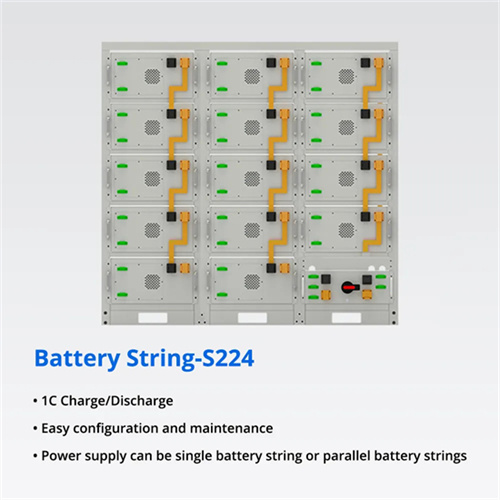How to detect the quality of photovoltaic panel current

How to Check Solar Panel Quality (Important Factors)
Are you wondering if the quality of your solar panel is good? If so, keep reading as we help you figure out the answer to that question and some other important information you might need to know. In this blog we discuss:

How to Test Solar Panels for Common Problems | Fluke
How to Test Solar Panels with an I-V Curve Tracer. An I-V curve tracer measures current and voltage output of a solar module in various conditions. Fluke recommends using the SMFT-1000 solar multifunction tool with the IRR2-BT

How to Test Solar Panels for Common Problems | Fluke
Learn why testing PV panels is important, how to use your DMM for testing solar panels, and what to look for when doing these tests. How to Test Solar Panels with a Multimeter. A multimeter is a tool that measures the voltage, current,

How to Check Solar Panel Polarity (Reverses + Fixes)
A solar panel''s polarity is essential when installing or replacing a solar panel. Solar panels are polarized to generate more power during the day, but if your system is not set up correctly, you could be wasting valuable

Solar panel quality testing: 5 common defects to avoid
Five common solar panel defects. The following defects are common when testing solar panels: Scratches on frame / glass; Excessive or uneven glue marks / Glue marks on glass; Gap between frame and glass due

How To Check Your Solar Panel & Regulator/Controller
The first two measurements use the solar panel on its own. When disconnecting the solar panel, regulator and battery, take care to disconnect the panel from the regulator first, and then

How to Test Solar Panel: A Step-by-Step Guide
Curve tracing, specifically using an IV curve tracer, is critical in testing solar panels. It helps plot the current-voltage characteristics of the panel, revealing its maximum power point (MPP). By understanding the MPP, users

Testing Solar Panels – 4 Ways |Output, Amps & Wattage
Find the panel''s current at maximum power (Imp) on the label on the back of your solar panel. Contrast the panel''s Imp value with the present reading from the clamp meter. Your current reading should roughly match the

Solar system fault finding guide & solutions
Solar panel fault-finding guide including examples and how to inspect and troubleshoot poorly performing solar systems. Common issues include solar cells shaded by dirt, leaves or mould. Check all isolators are all

How to find and repair ground faults in solar PV systems
Use a current clamp, like the Fluke 393 FC Solar Clamp Meter, to verify zero current in each PV circuit string before opening the fuse holders. Verify that no current is present, then open the

Testing Solar Panels: A Beginner''s Guide
Testing solar panels refers to evaluating the performance, efficiency, and overall condition of solar photovoltaic (PV) panels to ensure they generate electricity as intended. This testing can involve various methods and

Solar Panel Short Circuit Current: What is it? How to Measure?
Step 1: Take your Solar Panel and Make Sure it is clean. Clean it if you see some weird material accumulated in it. Step 2: Put your Solar Panel in a nice place where no shade from trees or

Failures & Defects in PV Systems: Typical Methods
It can diagnose some of the defects and failures on PV modules, connectors, AC or DC converter and panels. Furthermore, this method does not require shutting down systems. The main task of thermography measurement is to find the

Solar Panel kWh Calculator: kWh Production Per Day,
Here is the formula of how we compute solar panel output: Solar Output = Wattage × Peak Sun Hours × 0.75. Based on this solar panel output equation, we will explain how you can calculate how many kWh per day your solar panel

Parameters of a Solar Cell and Characteristics of a PV
Related Post: How to Design and Install a Solar PV System? Working of a Solar Cell. The sunlight is a group of photons having a finite amount of energy. For the generation of electricity by the cell, it must absorb the energy of the photon.

How to Test a Solar Panel: A Simple Step by Step Guide
To accurately assess a solar panel''s performance, measure the voltage and current output using a multimeter set to the appropriate settings. Analyze the voltage output by using a multimeter set to measure DC volts and

Photovoltaic (PV)
A PV module''s I-V curve can be generated from the equivalent circuit (see next section). Integral to the generation of tie I-V curve is the current Ipv, generated by each PV cell. The cell current is dependant on the amount

Solar Panel Output Voltage: How Many Volts Do PV
For many calculations, we will need to know how many volts do solar panels produce. It''s not all that easy to find the solar panel output voltage; there is a bit of confusion 24V, or 48V input and output voltage. It is the job of the charge

Related Contents
- How much current does a 555w photovoltaic panel have
- How much current does a photovoltaic panel have at 18 volts
- How to detect whether the photovoltaic panel is
- How much current does a 50w photovoltaic panel have
- How to connect the photovoltaic panel to measure the current
- How much current does the photovoltaic panel installed at home draw
- How many volts of current does a photovoltaic panel have per megawatt
- How much current does a 100 watt photovoltaic panel have
- How much current does a 200w photovoltaic panel have
- How deep is the diameter of the photovoltaic panel ground wire
- How to test the quality of photovoltaic panels of State Grid
- How to weld the photovoltaic panel steel frame correctly